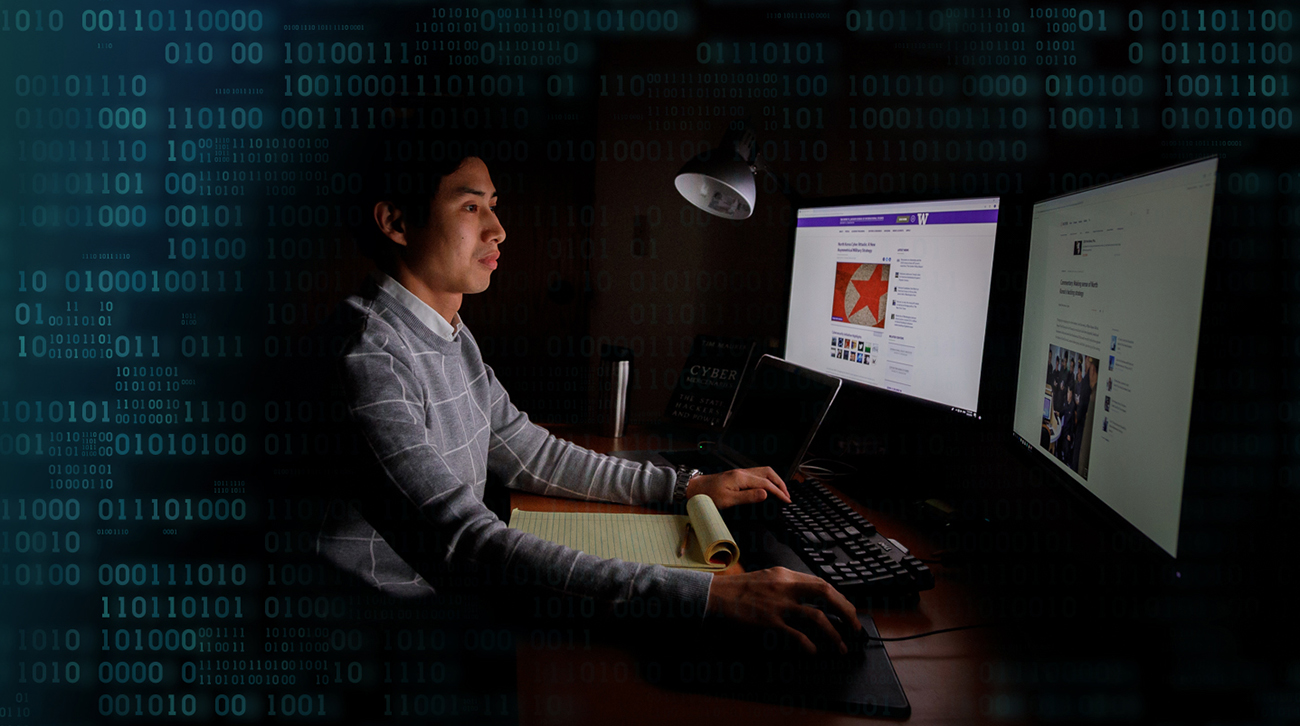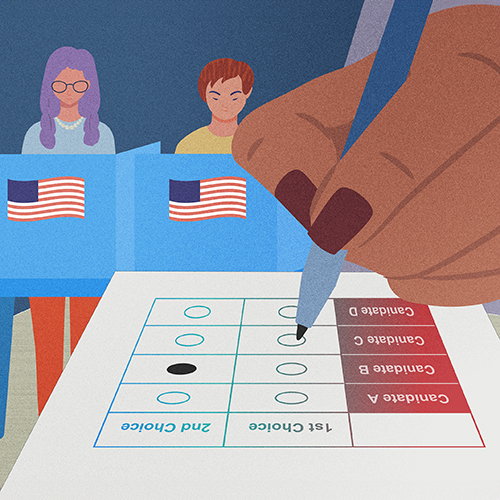The arsenal of weapons used in modern warfare is vast, including assault rifles, missiles, and bombs. But the most powerful weapon may be in your pocket: your cellphone. In cyberwarfare, hackers can potentially control nuclear or defense facilities in enemy nations by finding a back door into their computer networks. And that invasion can begin with malware you unknowingly open on your phone.
If that alarms you, don’t expect UW doctoral student Donghui Park, a cybersecurity fellow in the Jackson School of International Studies, to ease your mind. “In the information age, one teenage hacker can be more powerful than 10,000 soldiers,” says Park, part of the Jackson School’s Cybersecurity Initiative team. “One hacker can control many, many computers.”

Park knows a thing or two about warfare. After serving in the military in South Korea, he received his master’s degree in history at Yonsei University and became a professor of military history at the Korean Army Academy. At the UW, Park studies cyberwarfare as the latest dramatic development in the history of weaponry. He believes we are experiencing a paradigm shift, comparable to the introduction of black powder to the West, which led to arrows and swords being replaced by far more destructive canons and rifles.
“Cyberwarfare is so different from conventional warfare,” Park says. “My primary question is how nation-states aggressively use cyberspace to maximize their national interests. I’m also interested in cyberwarriors. Who are they? They aren’t trained in the regular army system. Hackers don’t go to military boot camp.”
To better understand cyber threats, Park learned coding and studies information technologies with guidance from the Cybersecurity Initiative team, led by Jackson School faculty Jessica Beyer and Sara Curran. Both Beyer and Curran are on Park’s PhD committee, along with Professor Donald Hellmann.
There is no blood in cyberspace but there is incredible danger.
In addition to reviewing reams of technical reports and official U.S. government warnings related to hacking, Park has interviewed cybersecurity experts in the U.S. and South Korea. Some of the South Korean experts are hackers themselves. “Some of them are monitoring North Korean illegal activity in cyberspace at night, as a hobby,” Park says. “Sometimes they post what they have found, or send data to their government.” Park describes these individuals as patriotic hackers because they volunteer information to help their government.
Other hackers, who Park calls contract hackers, are paid through secret contracts to serve as government-funded cyberwarriors, particularly in authoritarian countries. In North Korea, where citizens and most government officials have no access to the Internet, the military provides Internet access for contract hackers to serve the country’s military mission.
Park has identified a third type of hacker that he has dubbed sheltering hackers. They are not connected to the government like contract hackers, but their illegal activities may extend to attacking another country’s critical networks. The hacker’s own government will nevertheless look the other way because the hacking benefits the nation.
“In my opinion, every country has all three categories of hackers,” says Park. “These things are unspoken but are happening everywhere.”
Because these cyberwarriors blow up computer networks rather than people, their attacks may seem less brutal. But with the potential to control an enemy’s critical services — Israeli hackers famously infected Iran’s nuclear facilities with a destructive computer virus in 2010 — they can inflict tremendous damage.
Park says citizens can do their part to protect against cyberattacks by promptly installing recommended updates to their computer programs and apps. Those updates often correct software errors that hackers exploit to invade networks. If cyberwarriors do get into your phone or computer — by sending you an email that unleashes a virus, for example — they can follow a path of connected networks that may lead to sensitive information. But even with security updates, hackers sometimes find and exploit a glitch before programmers can fix it. Once they’re inside a system, they have the potential to wreak havoc.
“There is no blood in cyberspace but there is incredible danger,” says Park, “which is why the U.S. military’s new head of cybercommand is a four-star general. Cyberspace is the new battlefield along with air, sea, land, and space. It’s the new domain. As a military historian, I anticipate I will be studying cyberwarfare for years to come.”
. . .
Learn more about the Jackson School’s International Policy Institute and its Cybersecurity Initiative, which are supported through funding by Carnegie Corporation of New York.
More Stories

Is This Presidential Campaign Different?
UW History professor Margaret O'Mara provides historical context for this moment in US presidential politics.

Democracy by the Numbers
Mathematics and Democracy, an undergraduate mathematics course, explores the role of math in many aspects of democracy, from elections to proportional representation.

Making Sense of This Political Moment
To navigate this momentous election season, Arts & Sciences faculty suggest 10 books about the US political landscape.